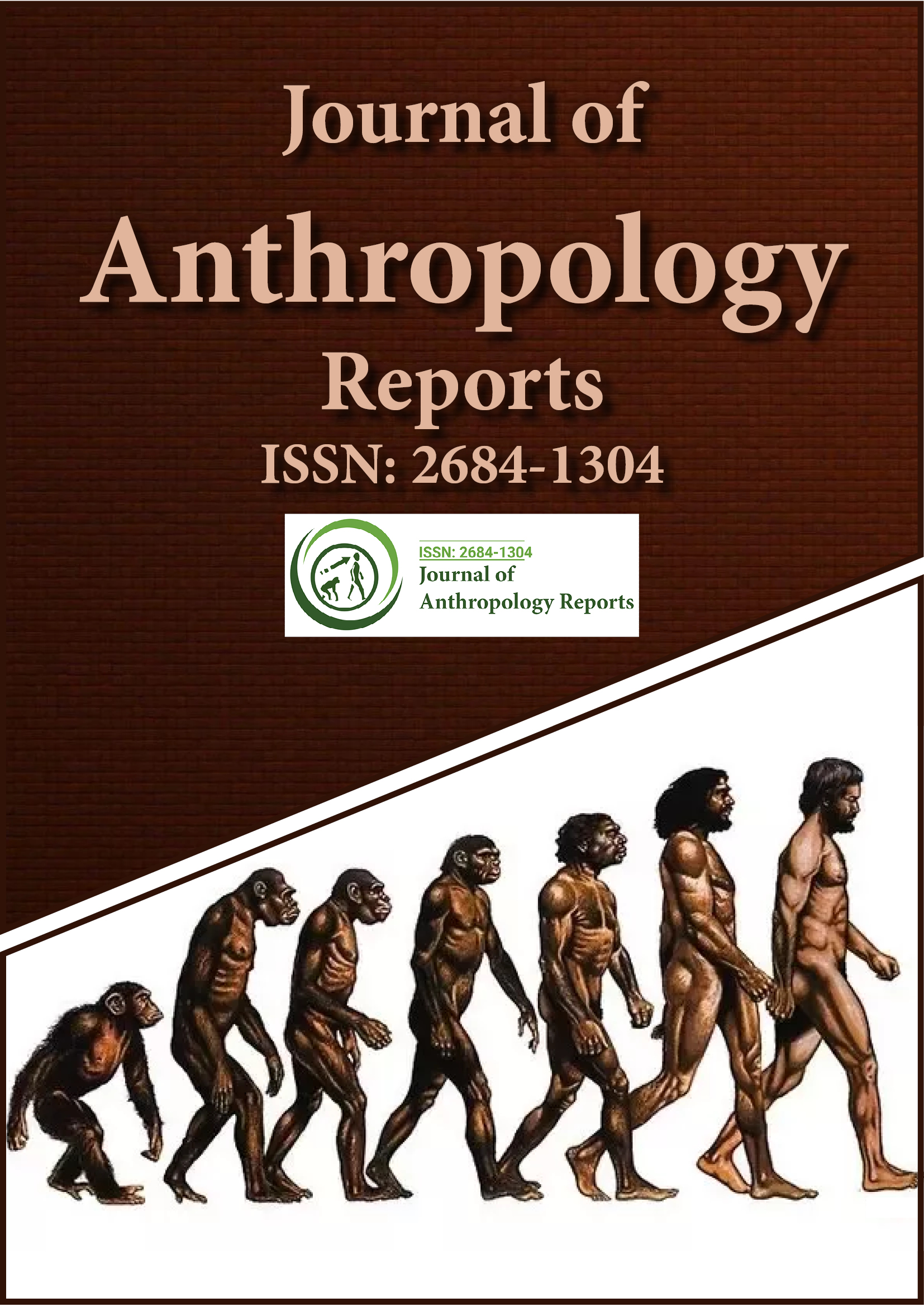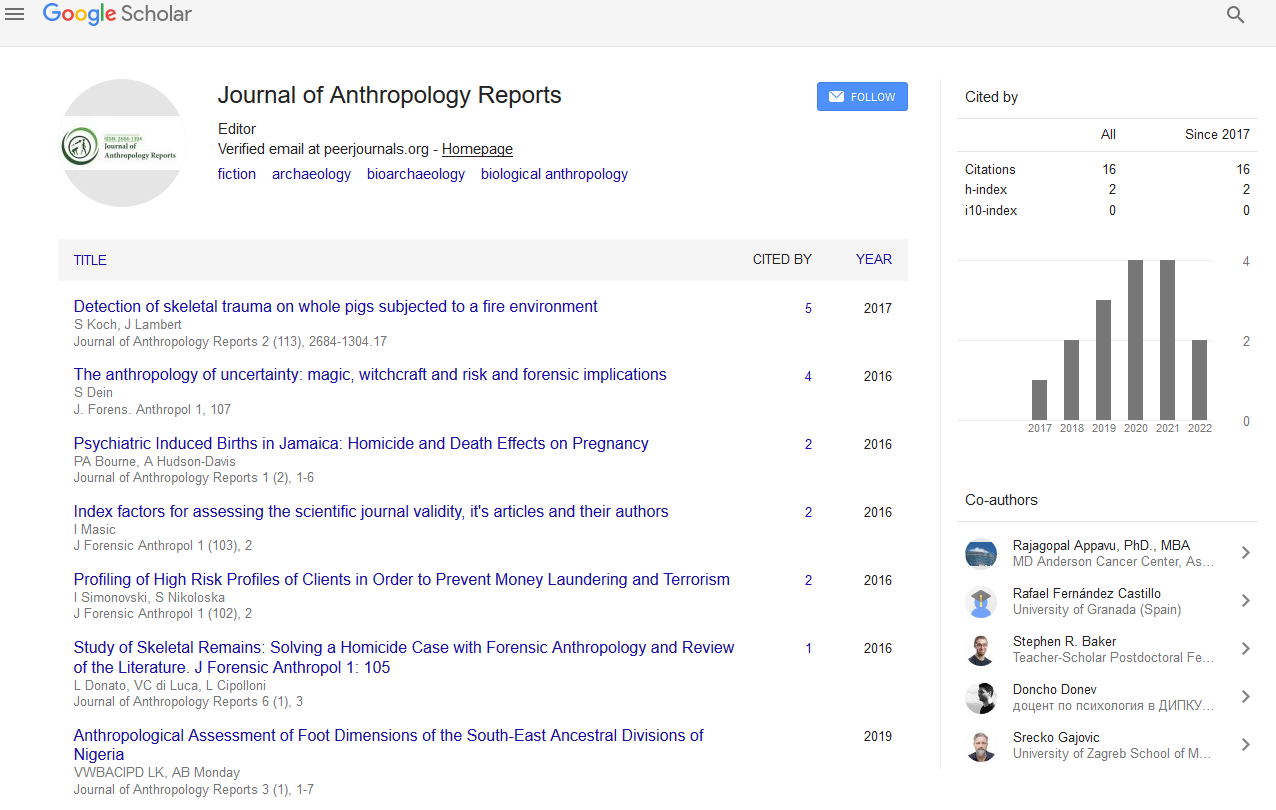Indexed In
- RefSeek
- Hamdard University
- EBSCO A-Z
Useful Links
Share This Page
Journal Flyer

Open Access Journals
- Agri and Aquaculture
- Biochemistry
- Bioinformatics & Systems Biology
- Business & Management
- Chemistry
- Clinical Sciences
- Engineering
- Food & Nutrition
- General Science
- Genetics & Molecular Biology
- Immunology & Microbiology
- Medical Sciences
- Neuroscience & Psychology
- Nursing & Health Care
- Pharmaceutical Sciences
Commentary Article - (2024) Volume 7, Issue 1
A Comprehensive Exploration of Futures Anthropology
Mitchell Rogers*Received: 04-Mar-2024, Manuscript No. JFA-24-25373; Editor assigned: 06-Mar-2024, Pre QC No. JFA-24-25373 (PQ); Reviewed: 20-Mar-2024, QC No. JFA-24-25373 (QC); Revised: 27-Mar-2024, Manuscript No. JFA-24-25373 (R); Published: 03-Apr-2024, DOI: 10.35248/2684-1304.24.7.186
Introduction
This extensive perspective delves deep into the emerging field of "Futures Anthropology," providing an in-depth analysis of its methodologies, challenges, and transformative impact on our understanding of the evolving narratives of human societies. Drawing on unique data obtained from speculative ethnographies and prospective scenarios, this article offers a thorough examination of how future anthropology serves as a guiding force for envisioning and influencing the diverse futures of global cultures.
Futures anthropology, situated at the nexus of anticipation and cultural understanding, is explored comprehensively in this article. With a focus on unique data derived from speculative ethnographies and prospective scenarios, we embark on a journey to unravel the foundations, potentials, and practical applications of future anthropology.
Foundations of future anthropology
An in-depth exploration of the foundations of future anthropology reveals how this field extends traditional anthropological methodologies to navigate the expansive horizon of possibilities. Unique data surfaces as anthropologists intricately weave speculative elements into ethnographic research, providing a complicated understanding of how cultures envision and prepare for their future trajectories.
Speculative ethnographies
This section delves into the pivotal role of speculative ethnographies within future anthropology, contributing unique data through the creation of plausible future scenarios rooted in cultural contexts. By examining these narratives, anthropologists gain profound insights into how communities conceptualize and adapt to the uncertainties that lie ahead, enriching our understanding of their resilience and foresight.
Prospective scenarios
Prospective scenarios, as a dynamic tool within future anthropology, generate unique data by exploring alternative futures. An in-depth analysis of these scenarios allows anthropologists to discern patterns, anticipate cultural shifts, and contribute meaningfully to the adaptability of societies in the face of an ever-evolving future.
Challenges and critiques
The complexities and challenges within future anthropology are thoroughly explored, acknowledging that unique data often comes with ethical considerations and potential biases. A nuanced discussion of these challenges is important fo r the responsible application of future anthropology and necessitates ongoing dialogues within the academic community.
Implications for anthropological practice
This section discusses the practical implications of future anthropology, showcasing how the unique data generated through this approach enhances traditional anthropological practices. The transformative potential of future anthropology is explored in contributing to societal well-being, cultural preservation, and informed decision-making on a global scale. In this pivotal section, we engage in a comprehensive discussion that synthesizes the diverse threads woven throughout the exploration of future anthropology. As we navigate the complex region of this emerging field, several key themes emerge, shedding light on the transformative potential, challenges, and implications for the future of anthropological practice.
Transformative potential
The transformative potential of future anthropology is evident in its ability to transcend traditional anthropological boundaries. By incorporating unique data from speculative ethnographies and prospective scenarios, anthropologists gain a forward-looking perspective that enriches our understanding of cultural dynamics. The field provide the oppotunities for envisioning and influencing futures, fostering a proactive role for anthropologists in shaping societal narratives.
Ethical considerations and challenges
Delving into the challenges, ethical considerations emerge as a central theme in future anthropology. The creation of speculative scenarios raises questions about potential biases, cultural sensitivity, and the impact on the communities involved. Navigating these challenges requires ongoing dialogues within the anthropological community to ensure responsible and respectful engagement in the speculative exploration of future trajectories.
Interdisciplinary collaboration
Futures anthropology thrives at the intersection of disciplines, encouraging interdisciplinary collaboration. The unique data generated contributes not only to anthropology but also to fields such as sociology, psychology, and environmental studies. This collaboration fosters a holistic understanding of future narratives, emphasizing the interconnectedness of diverse disciplines in navigating the complexities of human societies.
Conclusion
In conclusion, this extensive exploration positions future anthropology as a transformative discipline that offers unique data and perspectives, essential for navigating the intricate interplay between societies and their futures. As we contemplate the practical applications of future anthropology, its potential impact on anthropological practice becomes evident. The unique data obtained through speculative ethnographies and prospective scenarios enhances our ability to contribute meaningfully to societal well-being, cultural preservation, and evidence-based decision-making. This approach aligns with the evolving role of anthropologists as active contributors to shaping the futures of the communities they study. Through the integration of speculative ethnographies and prospective scenarios, anthropologists not only understand but also actively shape the unfolding narratives of human cultures.
Citation: Rogers M (2024) A Comprehensive Exploration of Futures Anthropology. J Anthropol Rep. 7:186.
Copyright: © 2024 Rogers M. This is an open-access article distributed under the terms of the Creative Commons Attribution License, which permits unrestricted use, distribution, and reproduction in any medium, provided the original author and source are credited.

